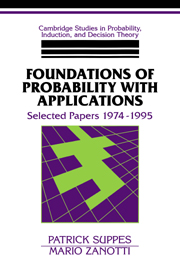Book contents
- Frontmatter
- Contents
- Preface
- Part I Foundations of probability
- Part II Causality and quantum mechanics
- 6 Stochastic incompleteness of quantum mechanics
- 7 On the determinism of hidden variable theories with strict correlation and conditional statistical independence of observables
- 8 A new proof of the impossibility of hidden variables using the principles of exchangeability and identity of conditional distributions
- 9 When are probabilistic explanations possible?
- 10 Causality and symmetry
- 11 New Bell-type inequalities for N > 4 necessary for existence of a hidden variable
- 12 Existence of hidden variables having only upper probabilities
- Part III Applications in education
- Author Index
- Subject Index
12 - Existence of hidden variables having only upper probabilities
Published online by Cambridge University Press: 05 June 2012
- Frontmatter
- Contents
- Preface
- Part I Foundations of probability
- Part II Causality and quantum mechanics
- 6 Stochastic incompleteness of quantum mechanics
- 7 On the determinism of hidden variable theories with strict correlation and conditional statistical independence of observables
- 8 A new proof of the impossibility of hidden variables using the principles of exchangeability and identity of conditional distributions
- 9 When are probabilistic explanations possible?
- 10 Causality and symmetry
- 11 New Bell-type inequalities for N > 4 necessary for existence of a hidden variable
- 12 Existence of hidden variables having only upper probabilities
- Part III Applications in education
- Author Index
- Subject Index
Summary
Great attention has been given to the exact formulation of locality conditions in the existence of hidden variables for quantum mechanical configurations that do not satisfy Bell's inequalities. In contrast, almost no attention has been given to examining what happens if the requirements for a probability measure are relaxed. The purpose of this paper is to show that local hidden variables do exist if the requirement of a probability measure is weakened to that of having only an upper probability measure. In the past several decades, upper and lower measures have been brought into the theory of statistical inference and the measurement of beliefs rather extensively, but in almost all cases considered in statistical theory or the belief framework, it is assumed that a probability measure exists, or in many cases, that an entire family of probability measures is given such that the sup and inf of the family defines the upper and lower measures. Sometimes still more is required, namely, that the upper–lower measure be a capacity (in the sense of Choquet) of infinite order. This is, for example, true of Dempster's theory of statistical inference. For an extensive recent analysis of the various theories of imprecise statistical models or belief functions using upper and lower probabilities, Walley (1991) is an excellent reference.
In contrast and as is well known, in standard quantum mechanical cases the Bell inequalities cannot be satisfied and this implies that there exists no probability measure.
- Type
- Chapter
- Information
- Foundations of Probability with ApplicationsSelected Papers 1974–1995, pp. 128 - 146Publisher: Cambridge University PressPrint publication year: 1996



